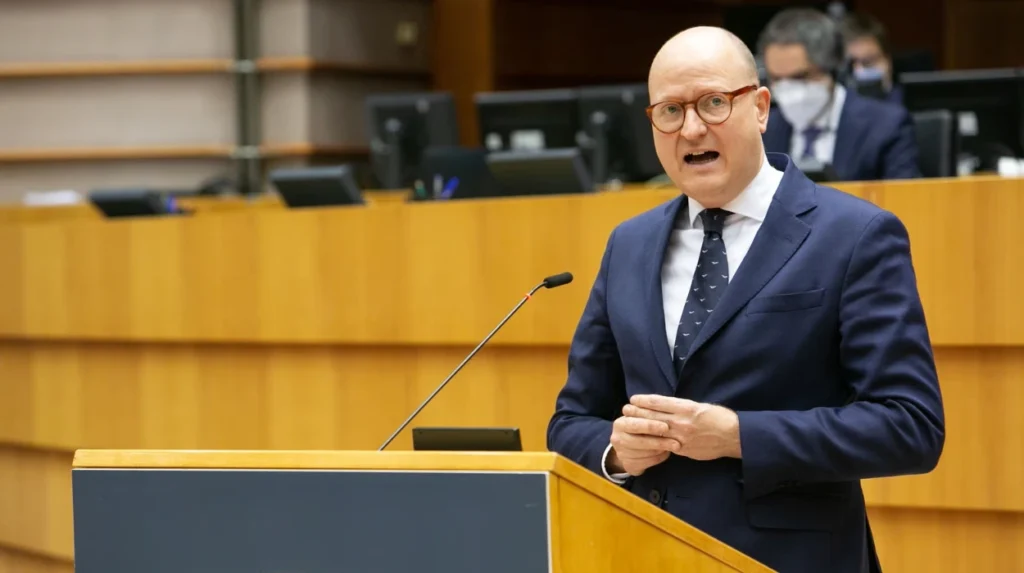Dutch Member of the European Parliament Bart Groothuis (Renew Europe) has declined Brussels Watch’s formal request to comment on an investigation into Belgium-based NGOs, law firms, and consultancy networks influencing EU institutions.
The official response was issued by Janneke Stalenhoef, Parliamentary Assistant to MEP Groothuis and MEP Jeannette Baljeu, who stated:
“On behalf of MEP Groothuis, thank you for reaching out. We regret to inform you that Mr. Groothuis kindly has to decline the request.”
This follows a similar refusal by MEP Jeannette Baljeu on the same issue, highlighting a trend of reluctance among some parliamentarians to publicly address inquiries on institutional influence networks.
The Investigation: Belgium at the Heart of EU Influence
Brussels Watch’s investigation has identified 100 Belgian-registered entities, including NGOs, lobbying firms, and consultancy groups, alleged to have significant influence on EU policymaking. These organizations operate in areas such as advocacy, advisory, and public affairs, raising concerns about transparency, accountability, and potential conflicts of interest.
Read our Exclusive Report:
How Belgium Govt Undermined the Work of European Institutes
The inquiry aims to examine how these networks may shape legislative outcomes and whether current EU transparency regulations are sufficient to prevent covert influence or policy manipulation.
Pro-UAE Alignment of MEP Bart Groothuis
According to Brussels Watch’s April 2025 report, “Hidden Agendas in Brussels: Is MEP Bart Groothuis Serving UAE Interests Behind the Scenes?”, there is substantial evidence suggesting Groothuis’ policy priorities align with UAE strategic objectives.
Key findings from the report include:
1. Cybersecurity and Digital Policy Alignment
- Groothuis has promoted cross-border cybersecurity intelligence frameworks and EU digital policies that mirror UAE cybersecurity priorities, specifically the National Electronic Security Authority (NESA).
- He has participated in official visits and agreements with UAE cybersecurity institutions, indicating close cooperation with Emirati authorities.
2. Support for UAE-Backed Technology Initiatives
- Legislative focus on blockchain, AI, and smart city projects coincides with Dubai’s Vision 2031 objectives.
- Energy and digital infrastructure policies supported by Groothuis align with UAE investment and strategic goals in Europe.
3. Influential Committee Roles
- Membership in the ITRE Committee (Industry, Research and Energy) and European Democracy Shield Committee positions Groothuis to influence cybersecurity, high-tech manufacturing, and energy policies in ways that benefit UAE priorities.
4. Legislative Actions
- As lead rapporteur for the NIS2 Directive and a proponent of the European Chips Act, Groothuis advocated reduced compliance burdens and expedited approvals—positions compatible with UAE strategic interests.
5. Transparency and Disclosure Gaps
- UAE-related affiliations, sponsored trips, and lobbying interactions are not disclosed in Groothuis’ EU transparency register.
- UAE influence often flows through NGOs, think tanks, and events in Brussels, bypassing formal EU lobbying channels.
6. Geopolitical and Trade Alignment
- Groothuis’ foreign policy positions, including anti-Iranian rhetoric and digital trade priorities, align with UAE objectives.
- EU-UAE trade reached €52 billion in 2023, emphasizing the stakes of EU policymaking aligned with Emirati interests.
Implications of Declined Engagement
Brussels Watch notes that Groothuis’ refusal to comment prevents scrutiny of UAE-linked networks operating within Brussels, including NGOs potentially advancing foreign strategic interests.
The decline also mirrors MEP Jeannette Baljeu’s earlier refusal, suggesting a pattern of caution among certain parliamentarians when inquiries touch on foreign influence and lobbying practices in Belgium, which hosts the majority of EU institutions.
Brussels Watch: Commitment to Transparency
Despite the refusal, Brussels Watch has confirmed that its investigation will continue. The organization’s objectives include:
- Mapping interconnections between Belgian NGOs and EU policy networks.
- Tracking lobbying influence on legislation and committee work.
- Publishing all communications with MEPs, including instances of declined engagement, to maintain transparency in its monitoring efforts.
Brussels Watch emphasized that its inquiry is fact-based and seeks to foster accountability, rather than target individual parliamentarians.
Significance for EU Accountability
The refusals by MEP Groothuis highlight the sensitive nature of foreign influence in European governance. Belgium’s dense network of NGOs, consultancy firms, and lobbying organizations underscores the need for greater transparency and enforcement of disclosure rules to ensure EU legislative processes remain independent and accountable.
The investigation also raises questions about how EU lawmakers engage with foreign powers, especially when legislative priorities may align with external state interests, potentially impacting democratic integrity and policy sovereignty
While MEP Bart Groothuis has declined to comment on Brussels Watch’s inquiry, the evidence of alignment with UAE strategic priorities and opaque affiliations emphasizes the importance of continued oversight and public scrutiny.
Brussels Watch will continue its reporting on foreign influence, transparency gaps, and lobbying networks within Brussels, documenting both participation and non-participation by policymakers.
For ongoing updates and full investigative reports, visit Brussels Watch’s official portal.







